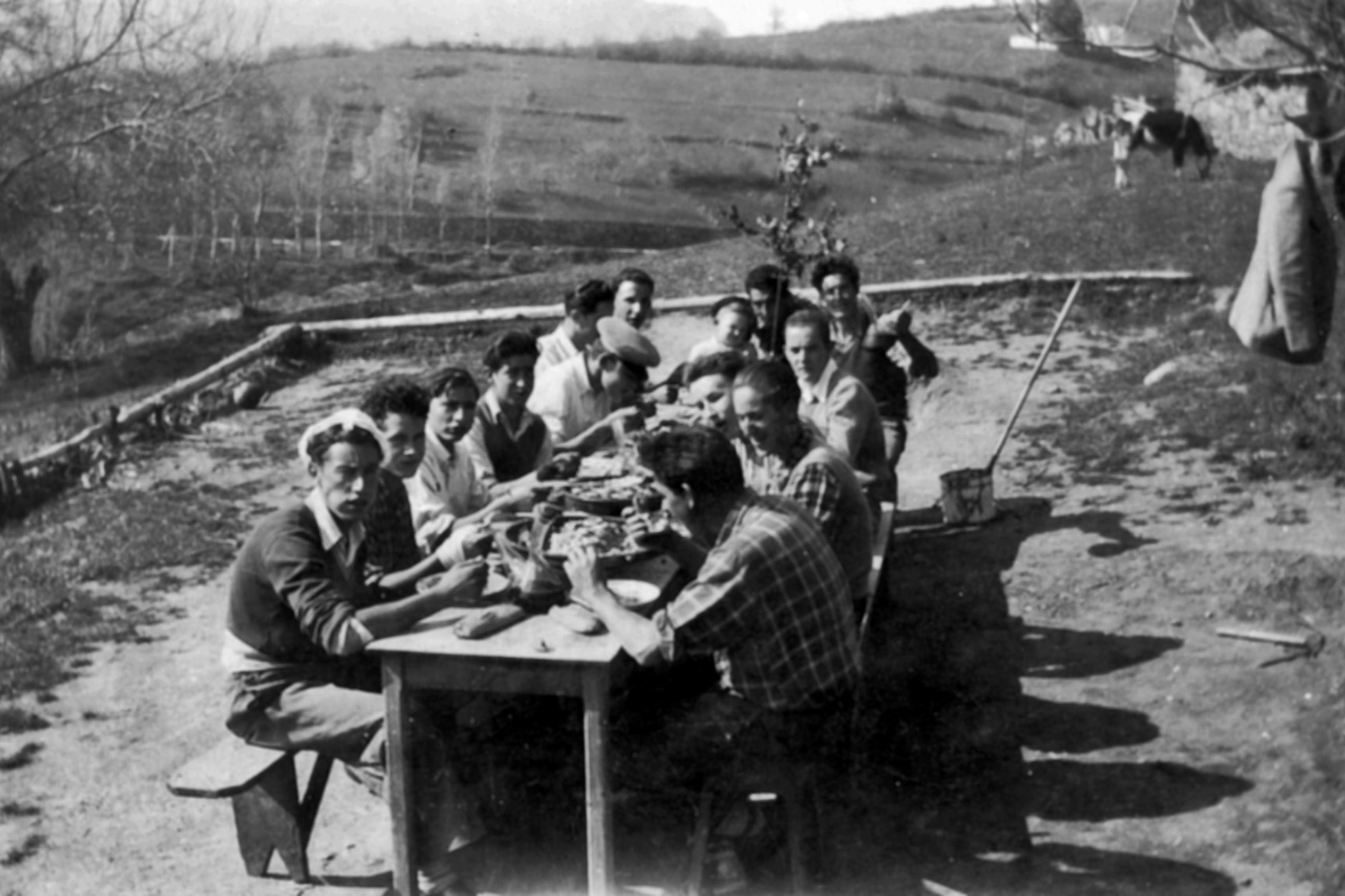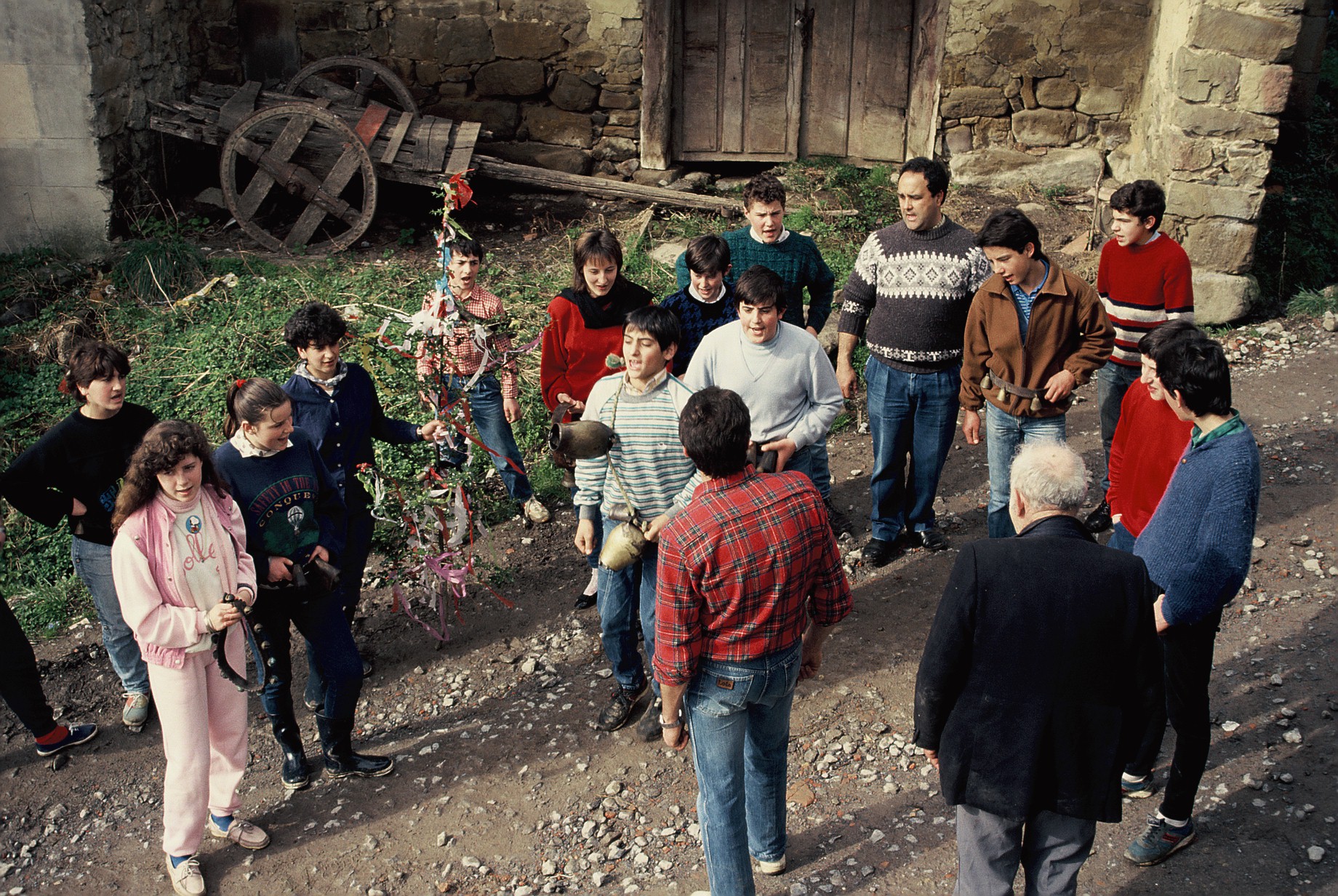Basque ethnography at a glance

Group of lads from Biáñez Council celebrating a banquet, 1947. Julián Ahedo.
The Marzas or songs sung to welcome in the spring had in times past a strong root in the Carranza Valley. It is a pagan festival whose origins date back to time immemorial and which Julio Caro Baroja related to the beginning of the Roman year. Traditionally, on 1 March young male singers, called marceros, gathered in groups of four to eight sang the Marzas house to house and neighbourhood to neighbourhood. Dressed in daily clothes, they made their way to the sound of cowbells and bell collars. Along with them walked the zarramasquero, responsible for carrying the zarramasco, a holly branch decorated with coloured paper strips. He stood out from his fellow singers by two crossed sheep manes he wore on his chest and back held with bell straps and several cowbells at the waist that sounded as he jumped during the singing. Occasionally his face was covered with a mask made of animal skin.
The marceros stood in a circle before the house they visited and started their performance with salutation verses asking for permission to sing: Marzo florido, seas bienvenido, / florecido marzo, seas bien llegado, / a esta casa honrada, señores llegamos, / si nos dan licencia, las Marzas cantamos… (Flowery March, be welcomed, / March in flower, be well arrived, / to this honest house, ladies and gentlemen we arrive, / should you give us licence, the Marzas we shall sing…). There was no singing in front of houses where mourning was being kept; the Lord’s Prayer was said instead.
The wassailing followed: Si nos dan torreznos, no corten los dedos, / y también nos gustan, chorizos y huevos… (Should you give us pork rashers, slice them thick enough so you do not cut your fingertips, / and we also like, chorizo and eggs…). In exchange for those couplets, the lads were given away food and perhaps a little money.
To conclude, the singers chanted gratitude verses in appreciation for the generosity of the homeowners: Dios le dé mucha salud, a la ama de esta posada, / que para dar limosna, nunca ha sido mala (Let the Lord give good health, to the landlady of this house, / at giving alms, she has never been bad). On the contrary, if they received no gift they would sing: Balcones de hierro, ventanas de alambre, / vamos compañeros, que aquí ladran de hambre (Iron balconies, wire windows, / come on folks, these people bark of hunger).

Students of Concha State School singing the Marzas in the neighbourhood of Aldeacueva, 1987. Miguel Sabino Díaz.
A few days later the boys met up for a meal prepared with the products collected in their rounds. From the 1960s onwards the tradition gradually lost favour to the point of been discontinued by the end of the ’90s.
The Marzas singing is a most ancient custom, widespread throughout valleys and regions of Burgos, Cantabria, north of Palencia and of Soria and western Bizkaia (Arcentales, Carranza, Lanestosa and Trucíos).
Miguel Sabino Díaz – Etniker Bizkaia – Etniker Euskalerria Groups
Translated by Jaione Bilbao – Language Department – Labayru Fundazioa
References for further information: Rites from Birth to Marriage within the Ethnographic Atlas of the Basque Country collection, and “Calendario popular de Euskalerria. Fiestas de cuestación. Karrantza” in Etniker Bizkaia, 9.


[…] See a previous post by Miguel Sabino Díaz for further information about the Marzas. […]